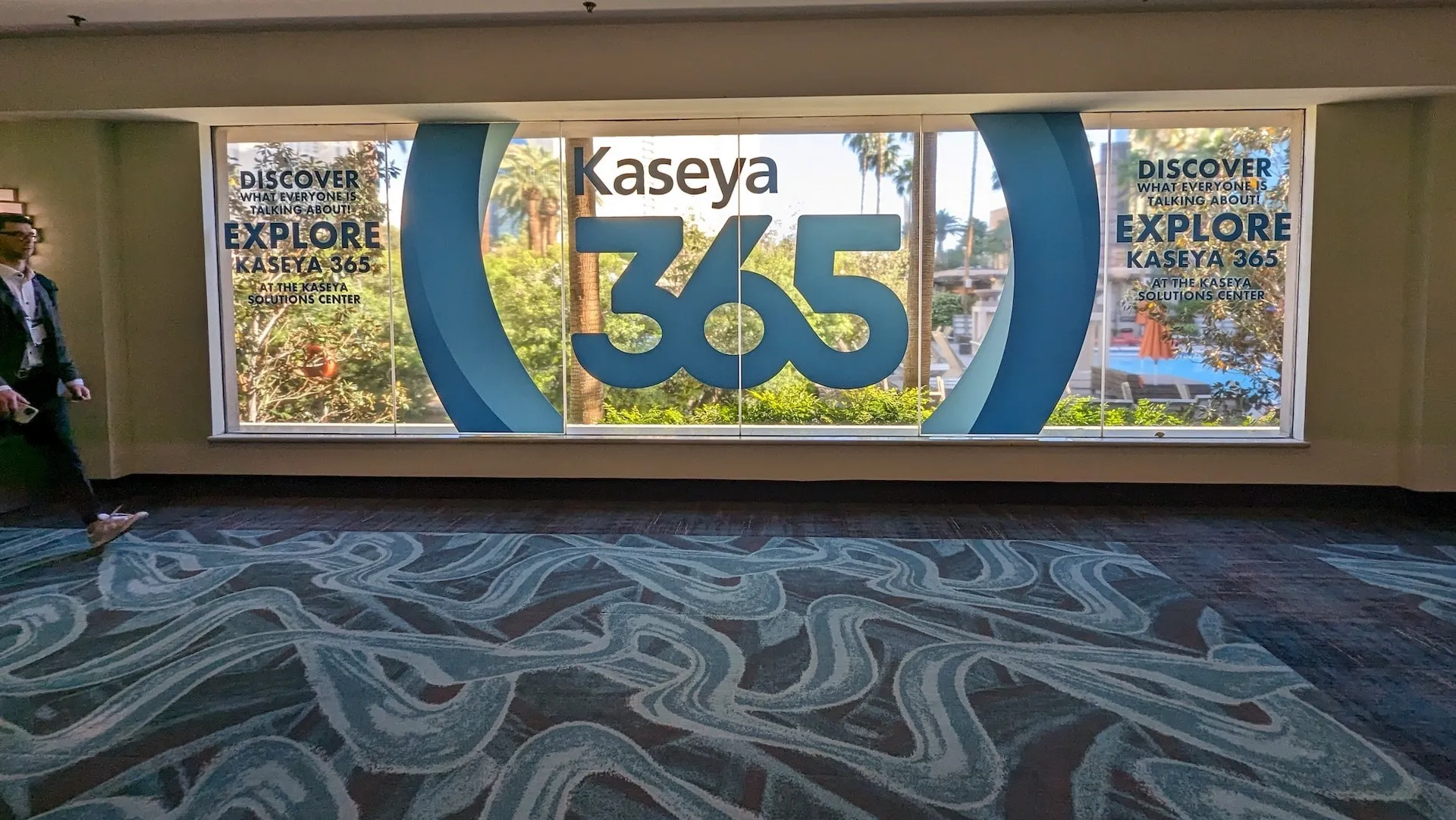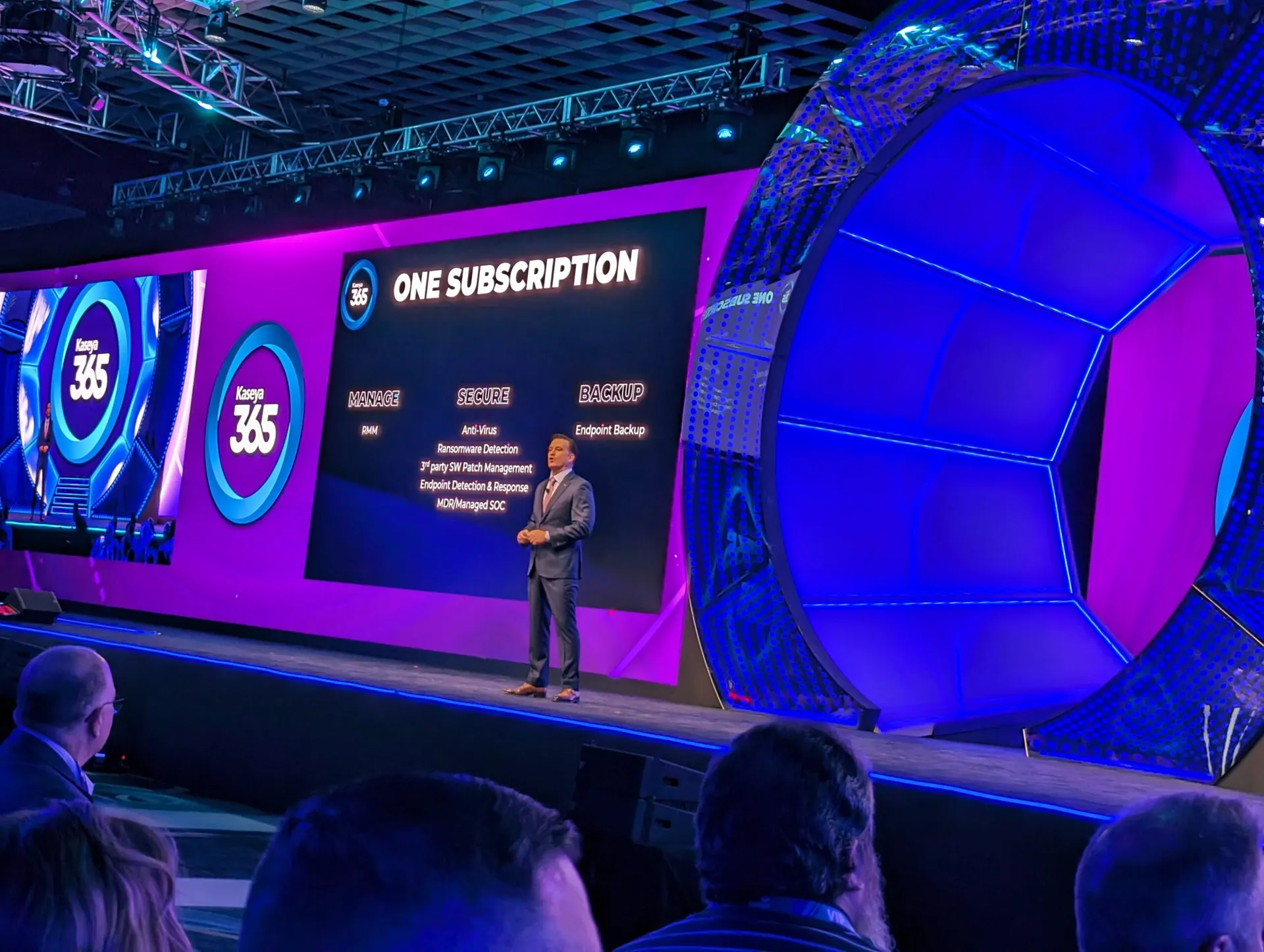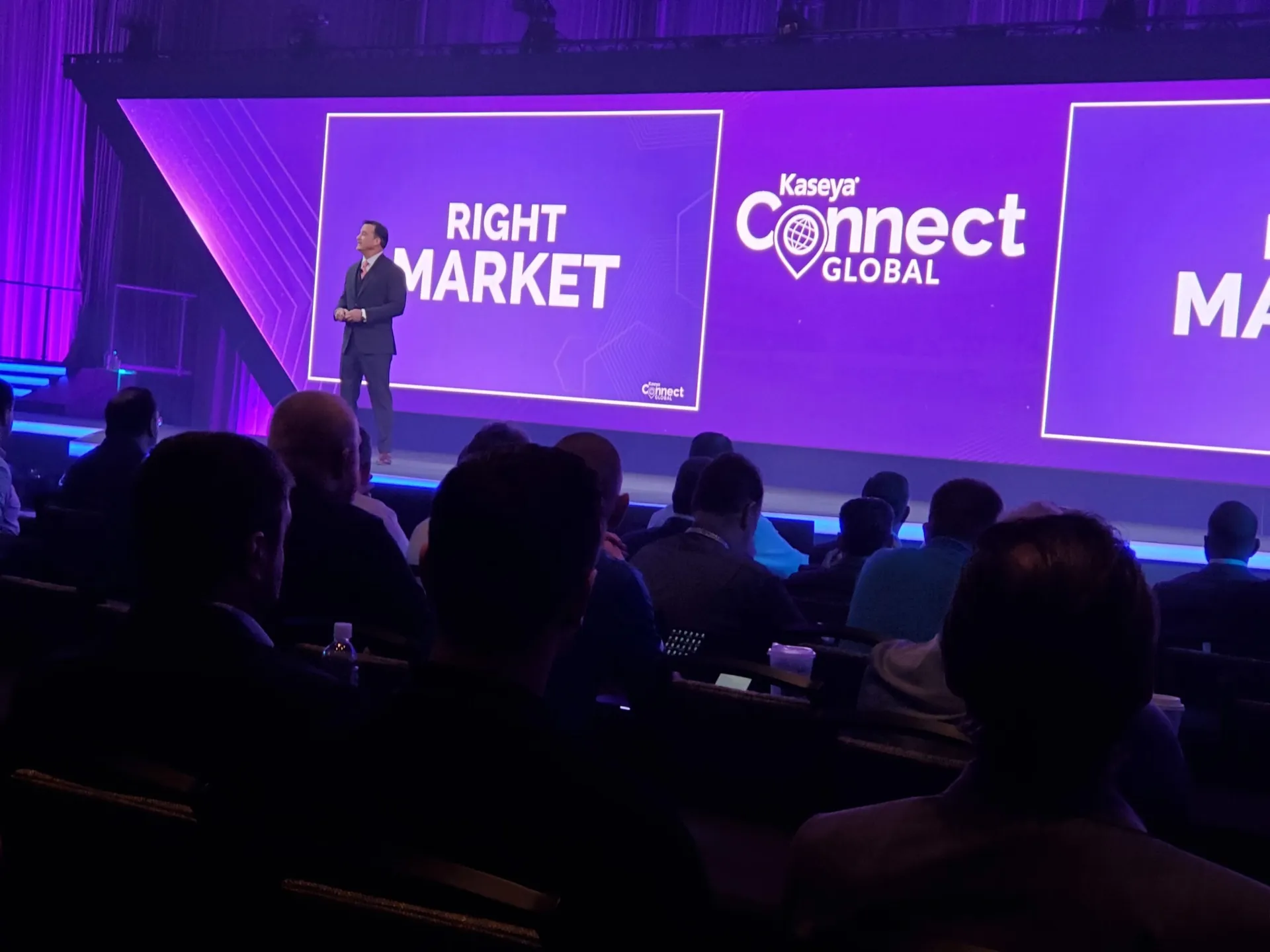How are MSPs and industry watchers responding to Kaseya 365 – the bundled package of MSP essentials offered at $3.99 per month per endpoint? There’s no real middle ground. Kaseya partners seem to like or love it. Other people in the industry think it is disruptive, anti-competitive and speculate that Kaseya has ulterior motives.
ChannelE2E has been on the ground at the Kaseya Connect event this week and we’ve been listening to the chatter. One group of MSPs sitting at a lunch table scrolling through social media criticisms of Kaseya 365 said that those critical MSPs weren’t Kaseya partners and they didn’t understand the nuances and the true benefits.
Another MSP said he’s seriously looking at it and may migrate his RMM off N-able to Kaseya 365. He may actually opt for the “Express” version for $1.75 per endpoint per month that does not include MDR for some of his customers because they already use another MDR and don’t want to switch.
Another MSP said the offer was compelling, but he was hesitating because going all-in with a single vendor also meant you had a single point of failure.
Kaseya partners at the event seemed impressed by and ready to embrace Kaseya 365. They like the Partner-First Pledge. Both announcements got big rounds of applause during CEO Fred Voccola's keynote address earlier in the week.
What the Skeptics are Saying
But many industry watchers voiced their displeasure at Kaseya’s announcement loud and clear. Perhaps the most outspoken on-the-record comment came from Huntress CEO Kyle Hanslovan, who posted his thoughts publicly in a LinkedIn post.
“It feels a lot like a ‘loss leader’ play in an attempt to accelerate MSP products into a hyper-commoditized state (trying to maximize pain to their competition and minimize their churn),” he wrote.
It’s unclear what those competitors’ responses will be. Kaseya competes directly against two other big companies – ConnectWise and N-able – and several smaller ones including NinjaOne, Atera, Syncro, SuperOps.ai and others. ChannelE2E expects that competitors are still analyzing what the move will mean for the overall market.
Canalys principal analyst for MSPs Robin Ody told ChannelE2E that there’s nothing new about what Kaseya is doing. It’s a new version of an old play – a price war with competitors to drive them out of the market.
“Kaseya 365 is not a revolution, being as it is essentially formalizing something which has been going on for a long time. All vendors offer informal incentives to convince partners to add more products and services, and even the MSP-in-a-box idea is pretty old hat. It feels like the same old problem vendors always offer trying to get partners past the average 1.2 or 2.4 products-per-partner which exists today,” he said.
Kaseya 365 offers partners the option to choose between the company’s two RMM options (VSA or Datto RMM). It also includes other key functions for MSPs such as MDR and backup. But it does not include all the suites of tools in the Kaseya IT Complete platform.
Ody said that the Kaseya 365 bundle could appeal to a certain type of MSP.
“I think this is more about the new MSP, the small company that is just getting started and wants to ramp up with some basic elements, and in that case simpler pricing is always attractive. Although, exactly how low the pricing is, and what the real savings will be, is a matter of some conjecture among partners right now,” he said.
Huntress’s Hanslovan noted that Kaseya’s move could “put pressure on ConnectWise and help stop the bleeding to Ninja and while also making up margin with additional products.” But Hanslovan thinks the $3.99 price is a temporary extreme discount. He pointed to a similar move by Uber to subsidize rides for the first several years until they forced taxi companies out of business.
“Once there was less competition, ride prices have kept climbing,” he wrote.
How Can Kaseya Afford to Offer These Discount Prices?
ChannelE2E posed that question to Keanan Ball, senior director of product marketing at Kaseya.
“We’re not worried,” he said.
Ball said the company ran a number of financial simulations to examine the bundle’s impact on Kaseya’s internal financial position, and tthat he company is confident in its strategy. He said that Kaseya 365 is a “volume play,” indicating that the company expects to gain many more customers via the discounted pricing.
Kaseya said the announced pricing is promotional. Ball said those who signed a contract with that pricing could lock it in for one year to three years depending on the length of the contract they chose – a guarantee that Kaseya codified with the announcement of its Partner-First Pledge that it made this week, too.
Ball said that Kaseya had originally planned to go to market with just the Kaseya 365 Pro offer at $3.99 per endpoint per month and not the no-MDR Express version at $1.75. But enterprise and other customers told Kaseya that they wanted to keep the MDR they already had in-house. Because of that, Kaseya introduced the Express version that excludes MDR and is priced at $1.75 per endpoint per month.
Kaseya's Economies of Scale
Ranjan Singh, Kaseya’s chief product officer, told ChannelE2E that Kaseya is able to offer lower prices now because it has innovated to remove cost from its product offerings. The company has scale; it has exabytes of data, he said. That gives it the ability to offer these lower prices.
Will anyone but entry-level MSPs buy Kaseya 365? Will it cannibalize Kaseya’s IT Complete platform that includes several suites of products for MSPs?
Kaseya did a market evaluation as it prepared Kaseya 365 and found that, on average, partners were spending about $13.50 per endpoint for the individual licenses that included RMM, patching, antivirus, ransomware protection, EDR, MDR, and endpoint backup. (And that spend was closer to $10 per endpoint without the endpoint backup included.)
Under the Kaseya 365 license, those same partners can get each endpoint covered with a single license for $3.99 covering all that aforementioned functionality, saving about $9.50 per endpoint per month. That makes Kaseya 365 valuable to partners of all sizes, Singh told ChannelE2E.
Singh also said it was a very conscious choice to announce the Partner-First Pledge at the same time as Kaseya 365 to assure partners that it would follow a reasonable price increase cadence. Part of the pledge is a cap on any increase in a current customer’s product pricing to a maximum of 5% at renewal, plus any adjustments as necessary tied to the Consumer Price Index. There’s no expiration date on that, Singh said. And the percentage and numbers stated in the pledge are a maximum allowed. Increases could be lower than that, he said.
As a side note, Singh said that many partners considered the Partner-First Pledge to be the bigger announcement than Kaseya 365, and their response to it was actually a surprise to him. He and other executives said during the event that most of what was in the Partner-First Pledge was already offered by Kaseya and mentioned in the end-user license agreement (EULA). Kaseya codified it in the pledge to raise awareness of what was offered, he said.
Kaseya is One of Many Platform Companies
Canalys’ Ody noted that Kaseya is not alone in pushing the platform message. Many other vendors are focusing on platform, too, including companies in the cybersecurity market.
He also offered some advice to MSPs evaluating cybersecurity solutions.
“People should be very cautious about commoditizing cybersecurity solutions. Vendor solutions should be being evaluated consistently by partners,” he told ChannelE2E. “MDR is differentiated around the remediation. Companies like Huntress, Blackpoint Cyber, Trend Micro, eSentire, or Rapid7, among others, are all doing good work to help partners with real-world remediation and getting partners back online in the event of breaches and data theft. Commoditizing that is unlikely to be particularly popular, especially as cyber insurance companies are becoming ever more stringent in their assessments of products and services offered by MSPs.”





